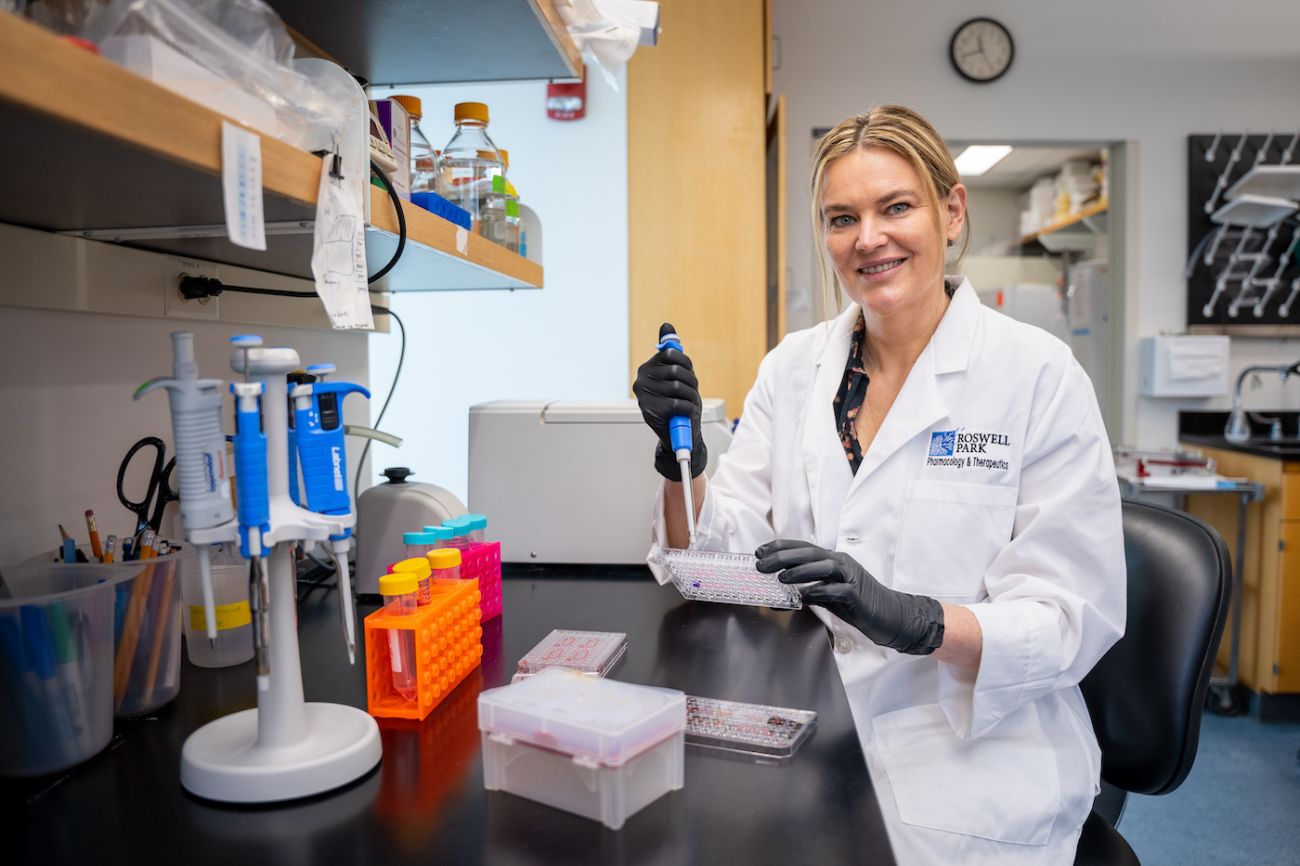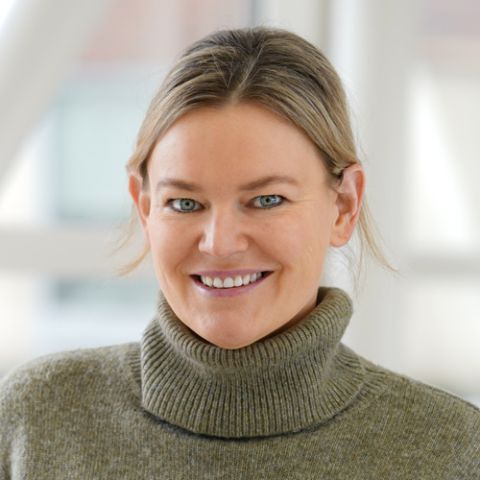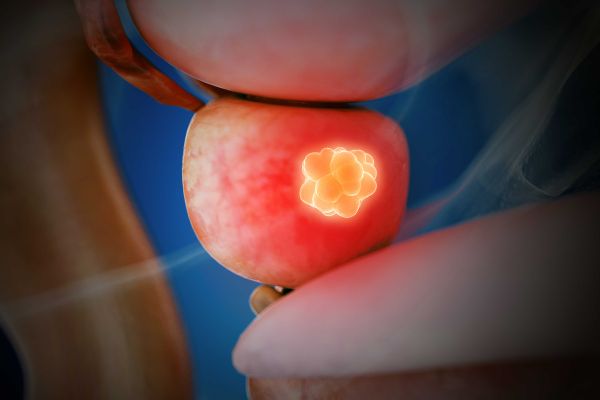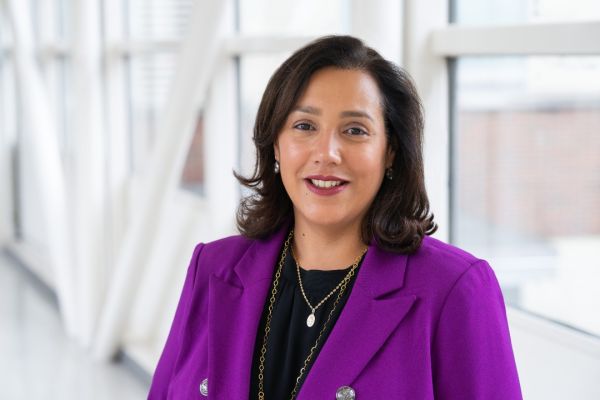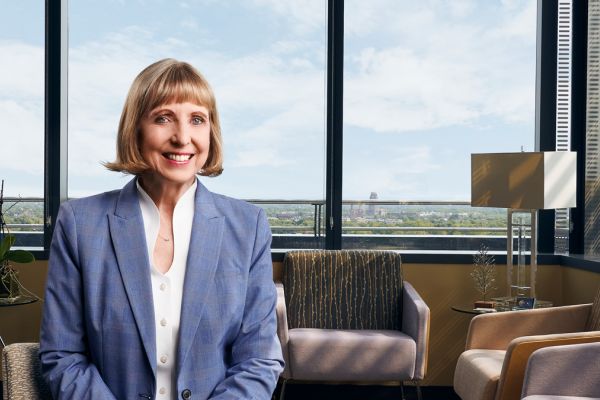For Anna Woloszynska, PhD, the path to running one of the nation’s top cancer research programs began nearly 4,000 miles away in forests and rivers near the Baltic Sea.
Dr. Woloszynska was born in northwest Poland in the 1970s, a time of political and economic upheaval marked by supply shortages and surging inflation, yet she has only good memories. “I had a wonderful childhood,” she says with a smile. “When I tell people that I grew up in communist Poland, they immediately think dark and terrible things. But my family was extremely outdoorsy, so we would spend every single minute that we had to spare outside, in nature. That is where I first became interested in science and the natural world around me.”
Some of her fondest childhood memories involve time spent fishing with her parents. “This may sound a bit gruesome, but I really loved dissecting fish. I was young, only 6 or 7 years old, but I was very curious about the fish’s whole anatomy. I wanted to learn it inside and out. How does it breathe? What makes it go up or down in the water? How does it regulate body temperature? I had so many questions. I would say that is where my interest in research began, with an incredible curiosity about living things.”
She and her family also spent time in the woods mushroom picking. “I was extremely good at identifying mushrooms by the age of 5 years,” Dr. Woloszynska recalls. “I really enjoyed classifying the different types of plants and fungi, and I loved spending time in the forest. My mother wanted me to pursue botany, but I was more interested in human biology and physiology. I’m extremely strong-willed and independent, so there was nothing that could sway me one way or another when I made my own decisions.”
Throughout her grade school and college education, Dr. Woloszynska always gravitated toward biology and science in general. She chose to attend Adam Mickiewicz University in Poznań, a top university in Poland known for its focus on life sciences. “I studied every different type of science program available — chemistry, biochemistry, bioengineering, even zoology,” she recalls. She finally landed in human biology and wrote her master’s thesis on a newly discovered set of human fossils in Atapuerca, Spain.
Soon after she visited the dig site in Atapuerca and spoke to the scientists who originally uncovered the fossils, Dr. Woloszynska began reevaluating the direction of her career. “I did not want to stay in Poland, and I did not want to study fossils. I decided that I wanted to keep my focus on science but return to the study of human biology, specifically human health in the context of disease.”
Science led her to the United States
As a natural scientist with innate curiosity about how things work, Dr. Woloszynska was eager to unlock the many mysteries of cancer. “Cancer was a subject that remained incredibly fascinating to me, with so many unanswered questions. I started to learn that cancer is actually an array of different diseases, and every cancer is different. It started becoming clear to me that if you want to study cancer, you can’t just study biochemistry, physiology, genetics or immunology. You have to take all of these different scientific approaches and put them together in a holistic, comprehensive way. That's why cancer researchers at Roswell Park put so much emphasis on team science.”
When Dr. Woloszynska came to the United States, she eventually landed in Buffalo. Her timing for entering a PhD program was a bit off, but that didn’t deter her from following her passion. “I arrived at a time that you would not normally apply to a postgraduate program, when the application periods had closed for the year, so I sought out some people here at Roswell Park, and they opened their doors to me. I ended up volunteering in the lab of Jenny Black, PhD, a professor in the Department of Pharmacology who recognized my potential and appreciated my scientific mind and curiosity. She was extremely encouraging, and her confidence in my abilities solidified my desire to forge a career in cancer research. She helped me build that confidence in what was still a relatively male-dominated field, and I’m very grateful for her support.”
During her time in the lab, Dr. Woloszynska attended a lecture by Adam Karpf, PhD, an associate professor in the Department of Pharmacology at Roswell Park, that would change to course of her career. Dr. Karpf’s presentation was on epigenetics, a relatively new field that focuses on environmental, behavioral and other changes that leave a mark on our genes. She immediately fell in love with the concept of epigenetic mechanisms in human health, and later, she joined his lab while earning her PhD from State University of New York at Buffalo, Roswell Park Comprehensive Cancer Center Division.
“It’s funny, because when I was taking my high school exit examinations in Poland, which are oral, I was asked to talk about evolution,” she said. “At the time, everyone thought that Darwin was the only one who had it right, you know, survival of the fittest and all. But during my oral exam, I talked about how Jean-Baptiste Lamarck was really onto something amazing when he came up with the concept of adaptation, the idea that all living things have this innate plasticity and ability to adapt and respond to their environment. I believe that Lamarck was the first epigeneticist.”
Inspired by Dr. Johnson
While earning her PhD, she attended another lecture that would change her career. In 2003, Candace S. Johnson, PhD, now President and CEO of Roswell Park Comprehensive Cancer Center, who had recently joined the Department of Pharmacology and Therapeutics, was giving a lecture about translational research, another relatively young concept at the time. “I was quite inspired by her ideas and vision, so afterward, I went to talk to her to learn more. Dr. Johnson opened her door to me, took the time to answer all of my questions, and encouraged me to join the scientific review committee to see science and health policy in action. Dr. Johnson eventually became my postdoctoral mentor, and her guidance and passion for science and cancer research have been instrumental in my career over the past 15 years.”
Encouraged to pursue her research interests, Dr. Woloszynska briefly left Buffalo in 2010 for Washington, DC, where she attended the National Academies Christine Mirzayan Science and Technology Policy Graduate Fellowship Program at the Institute of Medicine, The National Academies of Science. “My fellowship there was a totally eye-opening and transformative experience, and that is where I discovered that I really wanted to focus my work on identifying racial disparities in prostate and bladder cancer. I came back to Buffalo, and I spoke with Dr. Johnson about my new ideas and plans. She gave me carte blanche to pursue my research goals, so I got right to work.”
Research focused on disparities in prostate cancer
Since returning to Roswell Park, now working as an Associate Professor of Oncology in the Department of Pharmacology and Therapeutics, Dr. Woloszynska has secured two large grants from the U.S. Department of Defense to study the genetic and epigenetic vulnerabilities of prostate cancer in African American men, who currently have the highest rates of prostate cancer in the United States and the poorest outcomes. “With this new grant funding, we can take a much closer look at the biological determinants of these differences and how to address the reasons behind the poor outcomes in African American men with prostate cancer. It takes me back to my roots in epigenetics, which is really the study of the interactions between our DNA and the environment around us. We are born with a genetic code, but things such as exercise, diet, and produce chemical signals that tell our DNA what to do. Are these changes reversible? How can we modify or prevent them? These are some of the questions we’re trying to answer.”
Together with other leading female Roswell Park scientists such as Elizabeth Bouchard, PhD, and Elisa Rodriguez, PhD, Dr. Woloszynska is finding ways to target communities that may be at risk to improve the health of this unique population of male African Americans.
“If these external influences can change our DNA in a way that eventually leads to cancer, that means that they are changeable, not fixed,” says Dr. Woloszynska. “If we can find a way to alter certain biological changes or predispositions in a way that improves health or prevents future cancers, that could benefit not only an individual but also entire communities and generations to come.”
The possibility of finding biological reasons behind the increased risk of developing prostate cancer in African American men is the current focus of Dr. Woloszynska’s research. “Our ancestry may be contributing to our increased risk to develop specific forms of cancer, but the environment plays an important role,” she adds. “We are not just our genes. We are the environment in which we grow up. It is very important to take into consideration all these factors when we study cancer.”
